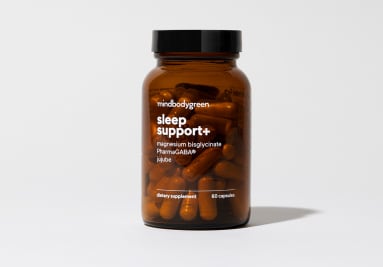Want To Slash Your Carbon Footprint? Following This Diet Will Help
Like so many sustainable actions, this one's great for your personal health too.

Image by Nuria Seguí / Stocksy February 2, 2023 Our series Healthy Planet, Healthy You explores just how tightly human health and environmental health are intertwined—for better and for worse. Each month, we'll share the latest news on how nature can rejuvenate us on one hand and damage our health when it's not cared for on the other. We'll end with timely tips and tools to help you care for your environment so it can care for you.
Advertisement
This ad is displayed using third party content and we do not control its accessibility features.
1. New research that spanned nine European countries and nearly 70,000 births found a correlation between living within close proximity to residential green space during pregnancy and giving birth to a baby that is a healthy weight. In contrast, living further from parks, gardens, and forests was associated with an increased likelihood of giving birth to a small-for-gestational-age baby, in the bottom 10th weight percentile. This connection seemed to be strongest among parents who lived in more northern countries, and those who had lower educational levels. The seemingly unlikely link could be driven by nature's ability to promote calm and enhance mental well-being—both cornerstones of a healthy pregnancy. (Read the research here1.) 2. Seaweed is a sustainable food source that also shows promise for protecting coastlines2 and reducing the environmental impact of animal agriculture. (It makes cows less gassy—no joke). New research set out to quantify just how much we stand to gain by investing in more seaweed farming in the future. As for the results, substituting seaweed into 10% of the average human's diet could save up to 110 million hectares (271 million acres; about the size of California and Texas combined) of land from being developed, and prevent 2.6 billion tonnes of carbon from entering the atmosphere each year. (Read the research here3.) This ad is displayed using third party content and we do not control its accessibility features. 3. In addition to seeking out a kelp-forward diet, following a Meditteranean eating plan can also help reduce your personal carbon footprint. New research published in the journal Environmental Health found that those who had higher adherence to the Mediterranean diet (which is high in fruits, vegetables, whole grains, beans, legumes, nuts, seeds, omega-3 rich fish, poultry, eggs, cheese, yogurt, olive oil, herbs, and spices) had lower dietary CO2 emissions. Following this eating pattern was also associated with lower land use, water consumption, and energy consumption. And like so many sustainable actions, this one is great for your personal health, too. (Read the research here.) 4. How's this for disturbing: A study published in Acta Ethologica found that birds who are exposed to urban noises develop different color beaks than those who are not. Researchers are unsure why this happens, but they suspect it could have to do with the way that human sounds increase corticosterone (a primary stress hormone in birds; akin to our cortisol), which impacts beak appearance. By driving these aesthetic changes, urban noise might also influence the way birds interact and choose mates. (Read the research here4.) This ad is displayed using third party content and we do not control its accessibility features. 5. Phthalates are a group of chemicals used to make plastics, and consistent exposure to them has been associated with metabolic syndrome, hormone disruption5, and impaired liver function. A first-of-its-kind study found that phthalates' adverse effects on metabolic health were passed down from male mice to two generations of offspring. "We found paternal exposure to endocrine disrupting phthalates may have intergenerational and transgenerational adverse effects on the metabolic health of their offspring," lead researcher Changcheng Zhou, PhD said in a statement. "To the best of our knowledge, our study is the first to demonstrate this." The next step is to test whether something similar is happening in humans. (Read the research here6.)Having access to green space during pregnancy can positively impact birth weight.
The climate-friendly diet of the future might be heavy on seaweed.
Advertisement
For now, stick to a Mediterranean diet if you want to reduce CO2.
Human activity is literally changing the way that birds look and interact.
Advertisement
The side effects of phthalate exposure may be passed down through generations.
Monthly focus: Embrace the chill.
Advertisement
This ad is displayed using third party content and we do not control its accessibility features.

 Hollif
Hollif 
































